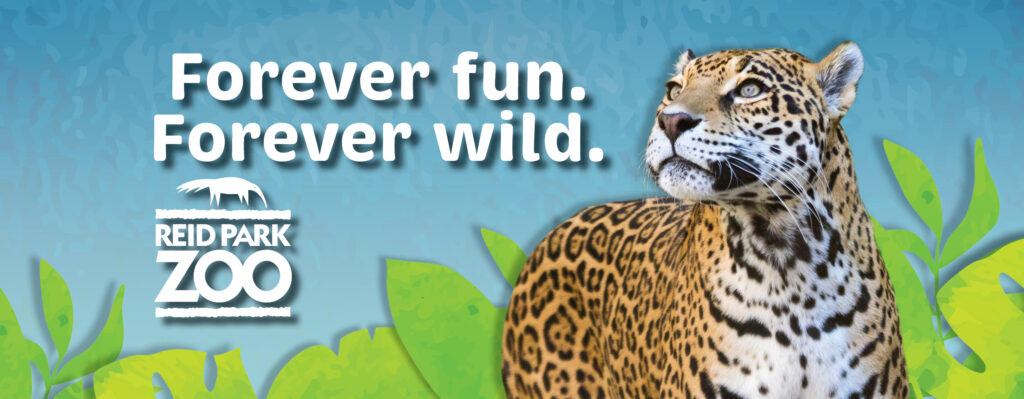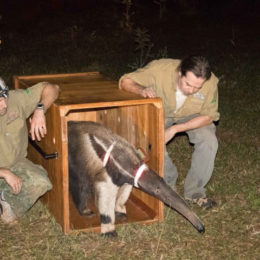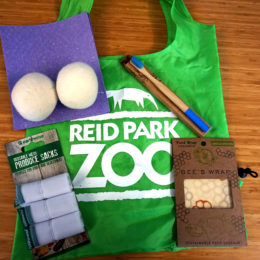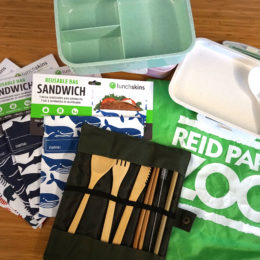Zoo Conservation

It’s our Mission!
At Reid Park Zoo – conservation is a part of everything we do, from using solar power to protecting elephants! We believe that our role as a conservation organization starts with our actions at “home” and extends beyond the gates of the Zoo.
Listed below are actions Reid Park Zoo takes to conserve wild animals and wild places on Zoo grounds. Please click each tab to explore more, including simple actions you can take at home too! By working together, we have the greatest impact!
To learn how Reid Park Zoo is protecting wild animals and wild places around the world, visit our conservation projects and partners page.
Conservation at Reid Park Zoo
SPECIES SURVIVAL PLANS
Although zoo babies are popular with our guests, the Zoo does not breed animals without thinking about the long-term responsibility. We work closely with other accredited zoos and aquariums around the country to make responsible breeding and animal placement decisions. It’s not just about having great animals in Tucson for you to learn from – it’s about working together to make sure that these species are protected for generations to come.
Some of the Zoo’s animals are part of a program called the Species Survival Plan®, or SSP®. The SSP® was developed by the Association of Zoos and Aquariums to help zoos and aquariums work together to do what’s best for an entire species. The SSP® determines which animals are good breeding matches, even if those animals are at different zoos. It can also restrict breeding if the captive population gets too large, or encourage breeding if the population gets too small. Even if a species in our collection is not officially part of an SSP®, we still consult our colleagues at other zoos to determine whether it’s responsible to breed a certain type of animal.
Reid Park Zoo strives to be a community leader in “green” construction. New construction at the Lee H. Brown Family Conservation Learning Center, Elephant Care Center and Animal Health Center features:
- Solar power panels to produce energy for the building (through a partnership with TEP)
- You can see how much energy we have produced at the CLC here.
- Highly efficient heating and cooling systems
- Recycled and sustainable construction materials
- Water harvesting and grey water capture
- Non-toxic, low fume paints and adhesives
- Natural day-lighting
- ….and much more!
We received the prestigious LEED Platinum certification from the U.S. Green Building Council for the choices we made during construction for the Conservation Learning Center. This was the first LEED platinum building in Southern Arizona.
Like many people in Tucson, the Zoo participates in the City of Tucson’s blue barrel recycling program. Zoo staff members follow the City’s recycling guidelines when separating recyclable material from other trash. Recycling bins around the Zoo encourage Zoo visitors to do the same. Zoo Keepers also reuse items such as burlap sacks, cardboard boxes and paper towel tubes for animal enrichment.
Do you live within the City of Tucson? Learn what can go in your bin here.
Join the @Tucson Environmental Services Facebook Page to stay up to date on the latest info!
To ensure the health of animal care staff and the animals at the Zoo, staff wear food and medical-grade gloves when caring for certain animals and prepping their food. These gloves are not able to be recycled through the City of Tucson Blue Bin program so the animal care staff recycles them through Terracycle.
Find out more from Terracycle to help recycle hard-to-recycle trash from your home or office.
Reid Park Zoo and our on-grounds vendors are continually evaluating our use of plastic in our daily operations and looking for ways to reduce our impact on the environment.
During education programs and in the Flamingo Grill, we use plates, cups, and utensils made from plants, like bamboo, corn, and sugarcane, or items that can be washed and then reused. Additionally, the Zoo and Grill have transitioned away from plastic water bottles to aluminum water bottles (which can be recycled over and over). When purchasing supplies from local stores, staff take along reusable shopping bags. Most notably you’ll find efforts to reduce plastic consumption in the Discover the Wild Gift Shop. Inside you can choose a Zoo souvenir plush animal made from 100% recycled material or a toy made from plastic that was diverted from going into the ocean. If you’re looking for options to reduce your use of single-use plastic, they also have plastic-free water bottles, veggie bags, and reusable straws for sale. Additionally, they choose products that have reduced plastic packaging, use wooden hangers over plastic ones, and skip using plastic bags at checkout.
Reducing our use of single-use plastic is something we all can do. Here are some easy, but impactful actions you can take:
- Bring a reusable water bottle with you when you visit the zoo.
- Bring your own reusable grocery bags with you to the store.
- Skip using a straw when dining out.
- Purchase a Go Green Kit!
- Each kit comes with an assortment of eco-friendly products that will help you reduce your use of plastic in your daily routine. All proceeds support the Zoo Crew’s conservation fund.
In 2022, the Zoo established a paper products procurement guide to establish guidelines for all staff when buying any paper products throughout the Zoo from office paper to toilet paper. These guidelines assist staff in making mindful, informed decisions about the paper products they buy to reduce the Zoo’s impact on the environment.
You can help to by:
- Avoiding or reducing your use of paper
- consider the environment before printing
- printing double-sided
- recycled used paper products
- use electronic alternatives for notes, meeting agendas, etc
- use scrap paper
- Purchase Sustainable Paper Products
- Choose products with at least 30% post-consumer waste content.
- Look for products certified by the Forest Stewardship Council® (FSC®).
- Choose paper products with non-chlorine bleach
- Look for:
- Processed chlorine free (PCF)
- Totally chlorine free (TCF)
- Elementary chlorine free (ECF)
- EcoLogo
- Green Seal certified
Let’s face it, the Zoo uses lots of water to keep animal exhibits and night houses clean and to keep our vegetation lush. In the desert, water is very precious so we use it as responsibly as possible. We use highly treated waste-water, or “reclaimed” water, for many of our non-animal area cleaning and irrigating needs.
You can help save water at home by following these easy actions:
- Installing low flow faucets and high-efficiency toilets that use 1.28 gallons of water or less with each flush
- Install a rainwater harvesting system to use to water the plants and trees in your yard
- Plant only native plants that do not need to be watered regularly
- Keep your home water leak-free: learn how here: http://www.smarthomewaterguide.org/
The Zoo also uses a lot of power to keep the animal exhibits’ lights, heaters, swamp coolers and pool filters running! We try to conserve energy whenever possible by turning off lights and computers when not in use. Additionally, during our annual Zoolights event, we use only low energy LED holiday lights.
To offset the power we do use, Tucson Electric Power donated solar arrays in several locations: the Conservation Learning Center, Elephant Care Center, Animal Health Center, and staff parking lot. These panels produce clean energy that feeds back into the TEP power grid. Check how much power we have generated at the Conservation Learning Center.
Looking for ways to be more energy efficient at home? Tucson Electric Power offers many energy-saving residential programs.
Over 50% of the products in the grocery store are made from palm oil ranging from food and personal care items to cleaning products. To keep up with our demand, oil palm (the tree used to make palm oil) plantations are increasing throughout Asia and South America. Unsustainable farming practices are destroying habitat for species such as orangutans, tigers, primates, and tapirs. However, rather than boycotting palm oil, which will lead to more resource-dependent vegetable oil to take its place, we can choose to support companies that invest in sustainable palm oil practices. This also helps the economies in countries that grow oil palm trees.
When purchasing candy for Boo at the Zoo or snacks for summer, Reid Park Zoo makes sure we purchase only products made from companies that are committed to sustainable palm oil.
You can at home too, when you are shopping be sure to look for the RSPO logo or if you do not see it, you can download this app from our conservation partners. Not all products have palm oil in it, so if a product does not have palm oil it will not be on the app.
You can also download sustainable shopping guides from our conservation partners at the Cheyenne Mountain Zoo.
GET the FREE Sustainable Palm Oil Shopping Guide App v2.0:


Here are some ways palm oil may be listed for your reference: Vegetable Oil, Vegetable Fat, Palm Kernel, Palm Kernel Oil, Palm Fruit Oil, Palmate, Palmitate, Palmolein, Glyceryl, Stearate, Stearic Acid, Elaeis Guineensis, Palmitic Acid, Palm Stearine, Palmitoyl Oxostearamide, Palmitoyl Tetrapeptide-3, Sodium Laureth Sulfate, Sodium Lauryl Sulfate, Sodium Kernelate, Sodium Palm Kernelate, Sodium Lauryl Lactylate/Sulphate, Hydrated Palm Glycerides, Ethyl Palmitate, Octyl Palmitate, Palmitoyl Alcohol

Reid Park Zoo is an official partner in the Seafood Watch® program. Managed by the Monterey Bay Aquarium, this program seeks to help sustain wild, diverse and healthy ocean ecosystems that will exist long into the future. As a program partner, we help educate our audience about seafood choices that promote sustainable fishing or farming practices. We also purchase fish and other seafood for our animals according to guidelines set by the program. You can check if your seafood is caught in a sustainable way by visiting and bookmarking https://www.seafoodwatch.org/.

Reid Park Zoo is committed to protecting wild animals and wild places, down to some of the smallest wild “residents” that make a huge impact on our planet – bees! Bees are one of the world’s most important plant pollinators, contributing largely to plant biodiversity. They alone are responsible for 1/3 of the world’s agricultural production too! Bees need our help because as the human global population grows, our need for more land to produce food increases. Additionally, mono-agriculture (planting only one type of crop) often takes away native plant land that bees rely on for food and shelter, and spraying areas with pesticides kills bees and other insects.
Reid Park Zoo is helping bees by partnering with local beekeepers to humanely trap the bees that start to create a hive on Zoo grounds. Relocation is necessary because once bees establish a hive, they will protect it vigorously (the same as we would protect our home and family from danger). This could pose a threat to animals and guests. Through this partnership, 12 bee boxes have been placed around Zoo grounds (mostly behind the scenes, away from guests). These boxes have been placed in specially chosen locations and have been built to match the bees’ specific hive requirements – research has proven that bees are very picky when establishing a new home so relying on this science will ensure that this project is successful. Once the bees have started to establish their new colony inside one of the bee boxes, the relocation service will remove the box, with the live bees inside, and relocate it to their farm – where the bees can live happily and continue to assist in pollinating our native plants and our food crops.
Additionally, Reid Park Zoo’s pollinator garden provides our native bees with shelter and food.
You can help bees by:
- Planting a native flower garden
- Going pesticide/insecticide-free
- Choosing relocation over extermination!
- Learning more about bees
- Along with honeybees (which are not native to the US), there are 4,000 native bees species in the US (1,300 are found in Arizona)- click here to learn more.
- Supporting your local beekeeping organization – http://southernazbeekeepers.org/
Food Waste:
Through the City of Tucson’s FoodCycle program, Reid Park Zoo is able to compost all food scraps produced by the Zoo’s kitchen and from staff lunches. The FoodCycle program is operated by Environmental Services in partnership with the University of Arizona Compost Cats. All businesses that generate food waste within Tucson city limits can participate including restaurants, hotels, grocery stores, etc. You can learn more about the program here.
Interested in composting at home? Check out this guide from the University of Arizona for some helpful tips!
Zoo Doo:
Through a partnership with the City of Tucson, animal waste from the Zoo’s herbivores (those that eat only plants) is picked up weekly and brought to the Los Reales Compost Facility. The compost is used for landscape projects done by the City of Tucson.








